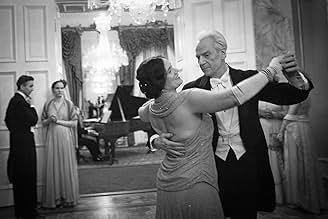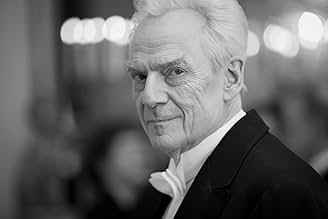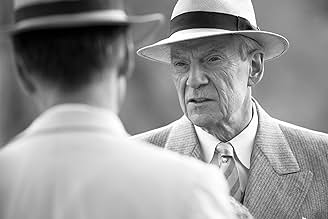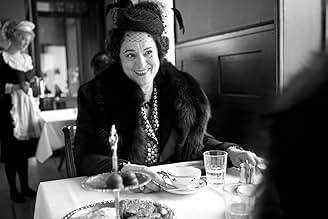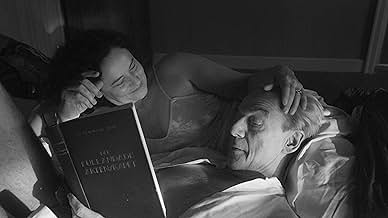Adicionar um enredo no seu idiomaA story based on the life of journalist Torgny Segerstedt, who alerted the Swedish public to the threat of Fascism in the 1930s.A story based on the life of journalist Torgny Segerstedt, who alerted the Swedish public to the threat of Fascism in the 1930s.A story based on the life of journalist Torgny Segerstedt, who alerted the Swedish public to the threat of Fascism in the 1930s.
- Direção
- Roteiristas
- Artistas
- Prêmios
- 3 vitórias e 7 indicações no total
- Direção
- Roteiristas
- Elenco e equipe completos
- Produção, bilheteria e muito mais no IMDbPro
Avaliações em destaque
The key to this film lies, in part, in understanding the meaning of the title. "The Last Sentence" is an ambiguous translation of the Swedish because a "last sentence" might refer to the last words a man writes. Instead, "sentence" here means the "judgment" one passes on a man who has died--a judgment that endures longer than the judgments that were passed on a man while he was alive.
And this citation of the "Hávamál" (an Old Norse 13th-century poem) has a special resonance in light of a toast proposed by Torgny Segerstedt early in the film: Segerstedt remarks something to the effect that we have a sacred duty to tell the truth in public matters, but no such duty in our private affairs.
Jan Troell has thus given us a portrait of Torgny Segerstedt as a man who fiercely refused to say anything other than the truth about Hitler and Nazism, but who, at the same time, was incapable of acting in a truthful and caring fashion in his private life--a man who seemingly had a deeper attachment to his dogs than to any of the people who deeply loved him.
And Troell has perhaps highlighted the shortcomings in Segerstedt's personal relationships precisely because he wants the viewer to sense this tension in the final judgment we place on the life of a man. Do Segerstedt's attempts to stir the conscience of the Swedes through his writings on the horrors of Nazism cancel out whatever negative judgment we might pass on his conduct as a father, husband or lover?
Maybe Troell poses just such a question because he himself may sense that he's nearing the end of his own life. And so what Troell wants, perhaps, is for us to realize that we are all faced with the question of the measure of a person's life and the final judgment to be passed on that life: what weight to give to the life one has lived in public, visible to all, or to the life that one has lived in the shadows (filled with love and affection or not) of one's private life?
And this citation of the "Hávamál" (an Old Norse 13th-century poem) has a special resonance in light of a toast proposed by Torgny Segerstedt early in the film: Segerstedt remarks something to the effect that we have a sacred duty to tell the truth in public matters, but no such duty in our private affairs.
Jan Troell has thus given us a portrait of Torgny Segerstedt as a man who fiercely refused to say anything other than the truth about Hitler and Nazism, but who, at the same time, was incapable of acting in a truthful and caring fashion in his private life--a man who seemingly had a deeper attachment to his dogs than to any of the people who deeply loved him.
And Troell has perhaps highlighted the shortcomings in Segerstedt's personal relationships precisely because he wants the viewer to sense this tension in the final judgment we place on the life of a man. Do Segerstedt's attempts to stir the conscience of the Swedes through his writings on the horrors of Nazism cancel out whatever negative judgment we might pass on his conduct as a father, husband or lover?
Maybe Troell poses just such a question because he himself may sense that he's nearing the end of his own life. And so what Troell wants, perhaps, is for us to realize that we are all faced with the question of the measure of a person's life and the final judgment to be passed on that life: what weight to give to the life one has lived in public, visible to all, or to the life that one has lived in the shadows (filled with love and affection or not) of one's private life?
7vsks
It was troubling to view Swedish director Jan Troell's 2012 film based on the experience of crusading journalist Torgny Segerstedt, so soon after the recent tragic assassinations at Charlie Hebdo in Paris. Segerstedt was editor-in-chief of one of Sweden's leading newspapers, and between 1933 when Hitler came to power and his own death in 1945, Segerstedt was a fierce opponent of Naziism, even though much of Sweden's leadership, including the king, was determined to remain neutral and out of the war. The struggle for journalists' right—some would say duty—to speak out despite risks to themselves and others has not ended. Beautifully played by Jesper Christensen, Segerstedt left himself open to criticism and to the devaluing of his motivations by his long affair with a Jewish woman, wife of his publisher. Hollywood's crusading journalists are noble and flawless (think All the President's Men), their presumed moral authority overshadowing any rough spots in their personalities, whereas Segerstedt's uncompromising character is pompous at times and unpleasant at others, he basks in his celebrity, and he's downright cruel to his wife. "Easy to admire, but very hard to like," said RogerEbert.com reviewer Glenn Kenny. Truth told, he loves his dogs best. Producing this film in black and white may have symbolic significance or may be just the preferred Scandinavian style—the film is Swedish, after all. In another Bergman-like touch, Segerstedt sees and converses with the black-clad ghosts of his mother and other women. Slow-moving, like the clear stream (of words?) against which the opening and closing credits appear, there is only a fleeting soundtrack to support the action. The film left me with a lot of unanswered questions. What happened with his writing? When the authorities demanded that a particular edition not be distributed because of its anti-Nazi editorial (which suggests they had imposed some censorship regime), Segerstedt printed it with a big white space where the editorial would have been. Nice. But we never learn whether he was allowed to continue writing after that (or how he was stopped) until a scene that takes place years later. How did the war affect the Swedish people? There's little hint of that, beyond putting up blackout curtains. It seems they had electricity, they had food, petrol, champagne at New Year's. It's primarily the awareness of Nazi behavior that the viewer brings to the film that explains and justifies both Segerstedt's simmering outrage and his country's policy of appeasement. He and his mistress both have suicide plans, if it came to that, but in the absence of any tangible, on-screen threat, their preparations seem self-dramatizing and almost childish. Segerstedt in a sense provides his own epitaph, which is also the Swedish title of the movie—"Judgment on the Dead"— based on a line from a famous Old Norse poem, which says the judgment on the dead is everlasting. History's judgment on Segerstedt would be that he was of course right about the Nazis. And if, as the King believed, it would have been his fault if the Germans invaded the country, he would have been among the first to die. NPR's Ella Taylor called the film "A richly detailed portrait of a great man riddled with flaws and undone by adulation."
''The Last Sentence'' (original title in Swedish- ''Dom över död man'') is the story of Torgny Segerstedt, a Swedish journalist whose fierce anti-nazi articles became a matter of great concern within the country's political life and stirred major backlash both in Germany and Sweden. The movie begins with Adolph Hitler's rise to absolute power in Germany in mid-1930s and follows the growing aggressiveness and hate-speech of the Third Reich until the ending of the Second World War, examining the influence and effect that the threat of a possible German invasion had on the decision-making of Sweden's government. The film focuses on the much-debated neutrality of Sweden and Segerstedt's bold critique on the inactivity of Swedish politicians even when Nazis invaded the neighboring Scandinavian countries. The basic flaw of ''The Last Sentence'' is that it follows an uneven rhythm and as a result, the movie can be divided into two parts, the first being tedious, almost annoying, while the second picks up speed and leads to an emotionally touching climax. The director, Jan Troell, is one of Sweden's greatest auteurs and each one of his films is characterized by its high-quality standards as well as magnificent performances. In this one, I think that Jesper Christensen's performance deserves to be in the spotlight but the whole of the cast does a tremendous job as well. My rating would be closer to 3,5/5.
Personal courage becomes a scarce commodity when the times get tough. And there weren't times much tougher than 1930's and the rise of Nazism. Europe stood paralyzed in an unlikely marriage of fear and denial. Veteran director Jan Troell tells a story of a public figure that bravely attacked Nazis in his newspaper column. Torgny Segerstedt was revered and much suspected. His principals made the others look corrupt and petty. And they were, but that is beside the point, because nobody has more concern about appearances than the immoral and tainted. The interesting quirk of this brilliant movie is that Torgny himself was a deeply flawed human being, in turns neglectful and cruel to his wife and kids. Somehow this man with such strong sense of morals, cared about the humanity in general, but alas, not for individuals. Well, that might be understandable. The messiness of humanity would try the patience off all saints combined. Our times prove that beyond any doubt.
Jesper Christensen with his Danish accent isn't very credible in his role as the Swedish newspaperman Torgny Segerstedt, famous for his uncompromising anti-Nazi stance. And could Jan Troell be any more boring director? Instead of making a movie about a man who stould up for liberty and against nazism to a great cost for himself, the director Troell just zeros in on his personal life and mistresses.
Você sabia?
- CuriosidadesThis is the second movie in which Jesper Christensen and Pernilla August are parts in a wife-husband-mistress triangle. Here Pernilla August is the mistress, in Drabet (2005) she was the wife.
- Erros de gravaçãoIn the movie at a party which is supposed to take place 1938 the swedish song "Hur har du det med kärleken idag?" is played and also sung by the character Maja Forssman. This song is from 1945 and was then made popular by the famous swedish artist Ulla Billquist.
- Trilhas sonorasFinlandia
Written by Jean Sibelius
Principais escolhas
Faça login para avaliar e ver a lista de recomendações personalizadas
Detalhes
- Data de lançamento
- Países de origem
- Idiomas
- Também conhecido como
- The Last Sentence
- Locações de filme
- Empresas de produção
- Consulte mais créditos da empresa na IMDbPro
Bilheteria
- Faturamento bruto nos EUA e Canadá
- US$ 62.506
- Fim de semana de estreia nos EUA e Canadá
- US$ 9.020
- 22 de jun. de 2014
- Faturamento bruto mundial
- US$ 328.005
- Tempo de duração
- 2 h 6 min(126 min)
- Cor
- Proporção
- 1.78 : 1
Contribua para esta página
Sugerir uma alteração ou adicionar conteúdo ausente



